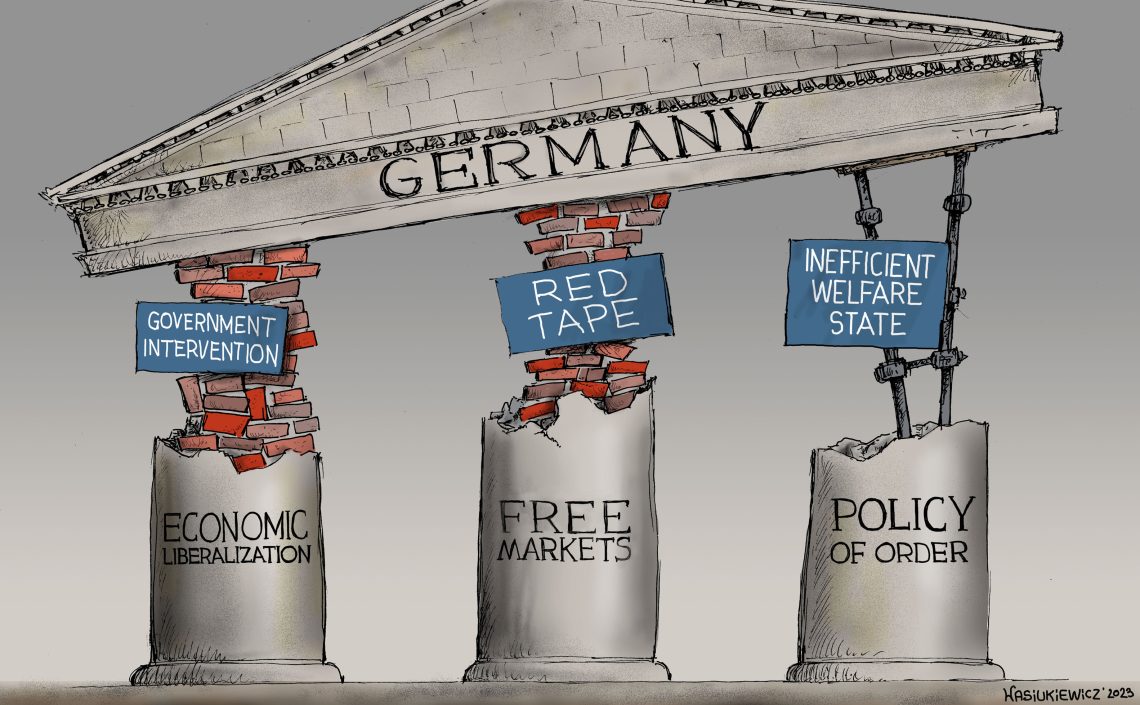Mistaken marginalization of Germany’s AfD
German leaders would be better off trying to understand the grievances that are behind the rising popularity of the Alternative for Germany, rather than continuing to isolate the party.

Friedrich Merz, chairman of Germany’s largest party, the Christian Democratic Union (CDU), indicated that a collaboration with the Alternative for Germany (AfD) party at the municipal level could be a possibility. This resulted in an outcry.
Especially during the 16-year chancellorship of Angela Merkel, the CDU maintained a strict firewall between themselves and the AfD, which many in the media and politics label as populist, nationalist and right-wing. The party was founded in 2013 by three economists who shared the classical liberal views of Ludwig Erhard, the West German minister of economy from 1949 to 1963 and chancellor from 1963 to 1966 who is credited for Germany’s post-World War II economic miracle.
Erhard’s social market economy, established in the 1950s, was the cornerstone of Germany’s recovery. It rested on three pillars: economic liberalization, free markets and a policy of order. The policy of order protected the vulnerable, promoted competition and limited government interference in business and the economy.
Over time, the original principles were largely abandoned in favor of increased government intervention, burdensome red tape and a progressively inefficient welfare state. The AfD founders – Bernd Lucke, Joachim Starbatty and Hans-Olaf Henkel, all three economists – also pointed out some of Europe’s structural weaknesses, especially in the construction of the common currency and disapproved of national and European policies that led to excessive debt and government spending.
Chancellor Merkel saw this party as a threat to her European policies and branded them anti-Europeans and right-wing. However, these labels were incorrect. Criticizing European policies does not necessarily imply opposition to European integration, and advocating for sound economics is not equivalent to extreme right-wing ideology.
In the 2014 European Parliament elections in Germany, the party secured 7 percent of the vote and 11 percent in 2019. The Merkel government continued to marginalize the party and push it into the right-wing corner. This unfortunate approach allowed other elements within the AfD to remove the three founders, partially fulfilling Ms. Merkel’s claims.
Marginalizing 20 percent of voters is unwise and will likely strengthen the protest movement.
The party now encompasses a wide spectrum of different voices and serves as a platform for voters who disagree with the prevailing policies in Germany, particularly regarding declining prosperity and infrastructure. It is fundamentally incorrect to label a large portion of the population – mainly frustrated by public inefficiencies – as anti-constitutional radicals. Such characterizations do not accurately reflect the diverse range of views within the party and its supporters.
There is ample reason for protest, as Germany’s infrastructure has significantly degraded over the past 20 years. For example, the Swiss rail system no longer welcomes an increased number of German trains due to the decline in the reliability of the German rail system.
Over-bureaucratization and high taxation have also led to general frustration among employees, who lose almost half of their pay to taxes and social security. Additionally, an irrational immigration policy has contributed to overall dissatisfaction.
Despite being shunned by other political actors, recent polls indicate that the AfD has become the second-largest party after the CDU, garnering 20 percent support. Apart from the policies of past governments, marginalization has played a role in the AfD’s success.
Mr. Merz faces heavy criticism for trying to ease the party’s isolation. However, he is right in acknowledging that voters are driven to the AfD for reasons, irrespective of differences in policy. The AfD leadership consists of diverse personalities with varying views.
Marginalizing 20 percent of voters is unwise and will likely strengthen the protest movement. A better approach would be to include the reasonable aspects of the party and focus on implementing reforms and improvements in the areas rightfully criticized by the AfD.

